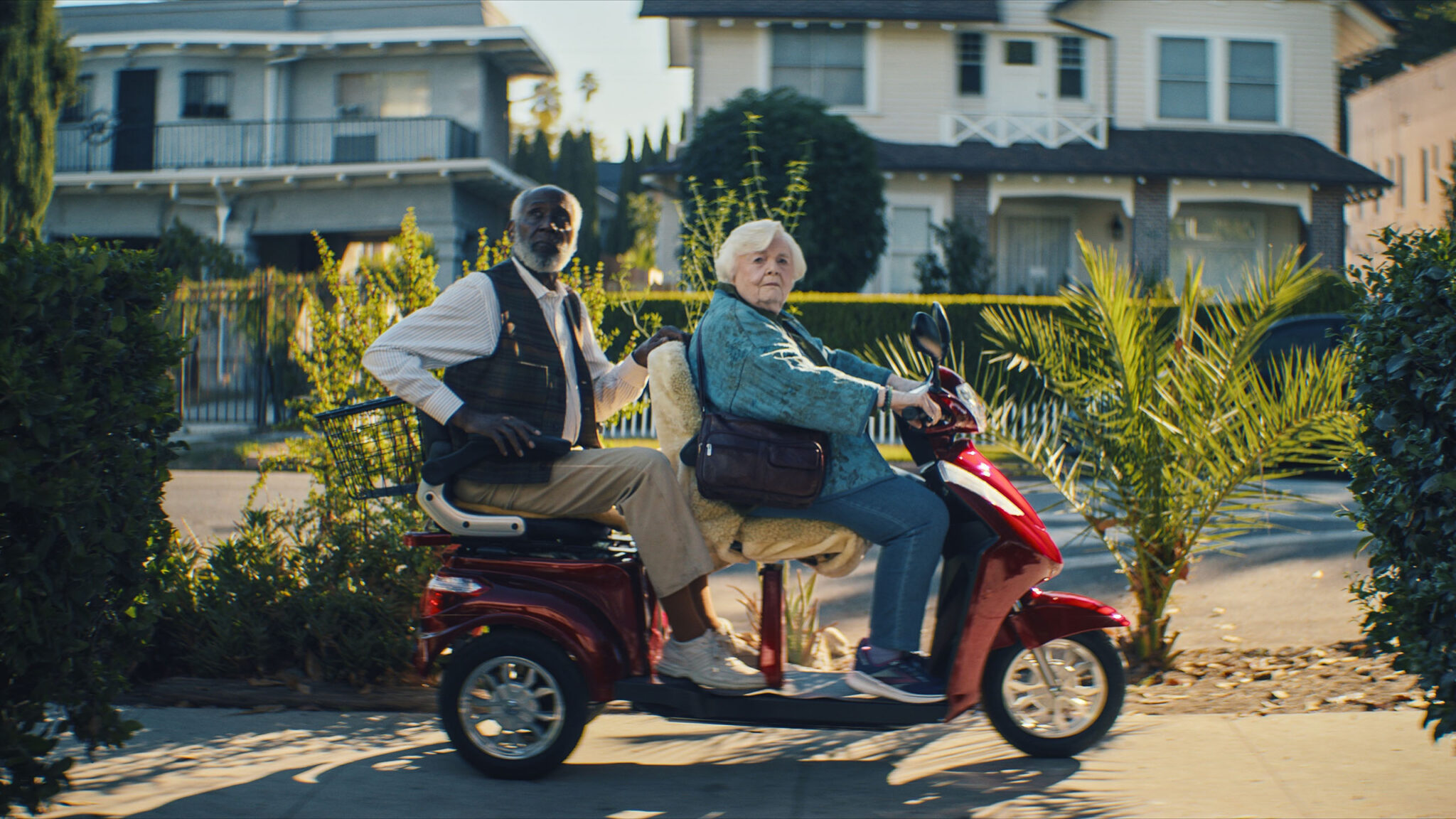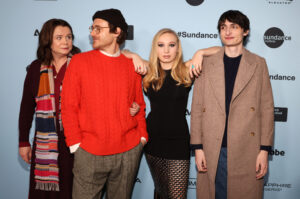By Bailey Pennick
One of the most exciting things about the Sundance Film Festival is having a front-row seat for the bright future of independent filmmaking. While we can learn a lot about the filmmakers from the 2024 Sundance Film Festival through the art that these storytellers share with us, there’s always more we can learn about them as people. This year, we decided to get to the bottom of those artistic wells with our ongoing series: Give Me the Backstory!
Just like Thelma Post, the titular hero of his debut feature, Josh Margolin doesn’t give up when faced with a challenge. This was true when having sound issues while filming Thelma in Los Angeles, California, and it was doubly true when it came to becoming a part of the Sundance artist community. “I actually submitted this project to [Sundance Institute’s] writing lab in a very early stage,” he recalls. “And even though it didn’t get in, I remember feeling very encouraged by the feedback. So I kept going.”
“So I kept going” not only got Thelma into the Premieres section of the 2024 Festival, it feels like an underlying mantra for the film itself. Thelma Post, a 93-year-old grandmother (the legendary June Squibb), gets scammed out of a lot of money because she believes her grandson (a delightful Fred Hechinger) is in serious trouble. Once she realizes that she knows where these criminals are operating out of, she ignores her family’s call for slowing down due to her age and enlists an old friend (the late Richard Roundtree) to keep going and help get her money back in a way that would make Mission: Impossible’s Ethan Hunt proud.
The result of this tenacity both on and off the screen is a delightful and heartwarming film about aging, independence, and family. Margolin credits some of this creative inspiration and emotional chemistry to a previous Sundance Festival film: “Little Miss Sunshine made a big impact on me when it came out, and I still love it. I was really drawn to the fact that it was a comedy with great performances and big laughs that also had a ton of heart and style. That alchemy really resonated with me and inspired me to try to make work with similar ingredients.”
Now 18 years after that film’s Sundance Festival premiere, Margolin is ready to be on the mountain and share Thelma with the world. “I associate Sundance with movies that are bold and surprising and personal — the kind of movies I’ve always aspired to make — so it’s an absolute dream come true to get to premiere Thelma at the Festival!”
Below learn more about the real-life Thelma, the one thing Margolin thinks all filmmakers should keep in mind, and the joy of watching June Squibb do her own stunts.

What was the biggest inspiration behind this film?
My grandma, Thelma, and I have always been incredibly close. She’s sharp, tough, and very much the matriarch of the family. So it was a rude awakening when a few years back she got duped by some phone scammers pretending to be me, and nearly sent them thousands of dollars for my “bail.” It shook me up to see her taken advantage of that way. So I started imagining what it would be like if she took things into her own hands and decided to get it back. I wanted to treat her like the star of her own action movie — to celebrate her spirit and tenacity, and literalize her fight for what’s left of her autonomy. I’ve always loved action movies —and my grandma — combining the two just made sense to me.
Why does Thelma need to be told now?
It’s a comedy about anxiety and impending loss, which I think the past few years have brought into sharp focus. Whether that’s the loss of a person or even just a sense of our lives before something as paradigm-shifting as a global pandemic, it’s become clear how quickly everything we take for granted can disappear. I wanted to explore those feelings and ideas in a tone that’s hopeful and life-affirming.
What was a big challenge you faced while making this film?
We were shooting on a sidewalk in the [San Fernando] Valley on Halloween night and ended up next to what we learned was an active crime scene. Helicopters with searchlights and loudspeakers were continuously circling our location and we couldn’t record any sound. June and Richard did the “silent version” of the scene, assuming we’d have to play it all without dialogue. Then, with minutes left in the day, the helicopters suddenly cleared, and June and Richard did the entire scene in one take. It was a buzzer beater moment.
Tell us an anecdote about working with your actors.
When we first test drove our mobility scooter, we realized it was incredibly fast and surprisingly tippy. We were terrified for June to get on and considered scrambling for a last minute replacement. But, before long, she became our absolute scooter queen and ended up performing almost all of her own stunts on it. Honestly, I don’t think she was ever as happy on set as when she was flooring it.
Your favorite part of making Thelma?
Anytime I gave Richard [Roundtree] a note, he’d listen quietly, take a long pause, then with a mischievous glint in his eye, he’d say, “Watch this.” I loved working with him. He brought a lot of warmth to the set and we all miss him. I’m grateful to have spent time with him while he was here.
Tell us why you got into filmmaking.
I think movies are how I first felt safe experiencing big feelings. As a kid, they really helped me make sense of my own anxieties. The second I could get my hands on a camera, I started making things — trying to give shape to something that often felt shapeless. Making movies was a way to express things I didn’t always know how to express in real life. Once I started I never stopped.
If you weren’t a filmmaker, what would you be doing?
How dare you ask me this. I have a very limited set of skills!
What is something that all filmmakers should keep in mind in order to become better cinematic storytellers?
Making a plan is as important as straying from it. Something that was very helpful for my DP David Bolen and I was thoroughly shot-listing every scene, then being willing to change on the day if something didn’t feel right. The prep let us feel confident enough to throw it away when we had to, which felt like a gift in an always unpredictable process.
Films are lasting artistic legacies; what do you want yours to say?
That our oldest generation shouldn’t be counted out. I think aging can be a heroic act in itself — to carry on through the limitations and fragility even when you know it’s all impermanent. It’s more intense when you’re approaching 100, but it’s kind of what we’re doing all the way through life. As my grandma would say, “What spirit!” I also hope June’s incredible performance is part of that conversation. She carries the movie on her shoulders with ease and was as much of a badass on set as she is on camera.
How do you want people to feel after they see your film?
I want them to call their oldest living relative to say hi.







